Çakar Space Exploration Agency: Difference between revisions
(Created page with "{{Çakaristan Article}} {{Infobox organization | name = {{PAGENAME}}<br>साकर अंतरिक्ष अन्वेषण एजेंसी | image = ÇSEA logo.png | abbreviation = ÇSEA | predecessor = Corian Space Agency ({{AN|1648}} - ({{AN|1661}}<br>Kraskosmos ({{AN|1650}} - ({{AN|1661}}<br>Krasnocorian Kosmos Agency ({{AN|1661}} - {{AN|1688}}) <small>''formally''</small><br>Salafuabad Space Centre ({{AN|1688}} - {{AN|1719}}) | formation = {{AN|1719}}...") |
No edit summary |
||
| Line 29: | Line 29: | ||
=== Orbital Command === | === Orbital Command === | ||
After the fall of Krasnocoria, the [[Common Cosmos Colonization Coalition]], the space agency of the [[USSO]], worked with the Çakari-flagged Salafuabad Space Centre to operate the satellites. Finally, the last satellite was deorbited in 1715 AN. Only [[Orbital Command]] was continued. Both during the period of the [[Great Apollonian Empire]], and after the transition from the [[Union of States around the Sovereign Oceans]] to the [[Collective Security Association]], [[Kildare|Kildarian]] participation was considered. | After the fall of Krasnocoria, the [[Common Cosmos Colonization Coalition]], the space agency of the [[USSO]], worked with the Çakari-flagged Salafuabad Space Centre to operate the satellites. Finally, the last satellite was deorbited in 1715 AN. Only [[Orbital Command]] was continued. Both during the period of the [[Great Apollonian Empire]], and after the transition from the [[Union of States around the Sovereign Oceans]] to the [[Collective Security Association]], [[Kildare|Kildarian]] participation was considered. | ||
| Line 86: | Line 86: | ||
== Active Programs == | |||
== | {|class="wikitable" | ||
|- | |||
! style="text-align: center; width:14%;"|Name | |||
! style="text-align: center; width:8%;"|Photo | |||
! style="text-align: center; width:18%;"|Type | |||
! style="text-align: center; width:8%;"|Start date | |||
! style="text-align: center; width:8%;"|End date | |||
! style="text-align: center; width:8%;"|Status | |||
! style="text-align: center;width:47%;"|Notes | |||
|- | |||
|align=center| [[Orbital Command]] | |||
|align=center| [[File:Orbitalcommand.jpg|200px]] | |||
|align=center| manned<br>([[wikipedia:space station|space station]]) | |||
|align=center| {{AN|1675}} | |||
|align=center| | |||
|align=center bgcolor=#bfffba| Active | |||
| The first [[wikipedia:space station|space station]] launched by '''[[Common Cosmos Colonization Coalition|4C]]'''. Operated by the Çakar Space Exploration Agency since 1719 AN. | |||
|- | |||
|align=center| Najma-1 | |||
|align=center| [[File:Najma-1.png|200px]] | |||
|align=center| unmanned<br>([[wikipedia:Satellite|satellite]]) | |||
|align=center| {{AN|1723}} | |||
|align=center| | |||
|align=center bgcolor=#bfffba| Active | |||
| First satellite launched by the Çakar Space Exploration Agency. | |||
|- | |||
|align=center| Najma-2 | |||
|align=center| [[File:Najma-2.png|200px]] | |||
|align=center| unmanned<br>([[wikipedia:Satellite|satellite]]) | |||
|align=center| {{AN|1725}} | |||
|align=center| | |||
|align=center bgcolor=#bfffba| Active | |||
| | |||
|- | |||
|align=center| Najma-3 | |||
|align=center| [[File:Najma-3.png|200px]] | |||
|align=center| unmanned<br>([[wikipedia:Satellite|satellite]]) | |||
|align=center| {{AN|1727}} | |||
|align=center| | |||
|align=center bgcolor=#bfffba| Active | |||
| | |||
|- | |||
|align=center| Najma-4 | |||
|align=center| | |||
|align=center| unmanned<br>([[wikipedia:Satellite|satellite]]) | |||
|align=center| {{AN|1727}} | |||
|align=center| | |||
|align=center bgcolor=#fa8072| Did not achieve orbit | |||
| | |||
|- | |||
|align=center| Najma-4B | |||
|align=center| [[File:Najma-4B.png|200px]] | |||
|align=center| unmanned<br>([[wikipedia:Satellite|satellite]]) | |||
|align=center| {{AN|1729}} | |||
|align=center| | |||
|align=center bgcolor=#bfffba| Active | |||
| Replacement of Najma-4 | |||
|- | |||
|align=center| Najma-5 | |||
|align=center| [[File:Najma-5.png|200px]] | |||
|align=center| unmanned<br>([[wikipedia:Satellite|satellite]]) | |||
|align=center| {{AN|1728}} | |||
|align=center| | |||
|align=center bgcolor=#bfffba| Active | |||
| | |||
|- | |||
|align=center| Najma-6 | |||
|align=center| [[File:Najma-6.png|200px]] | |||
|align=center| unmanned<br>([[wikipedia:Satellite|satellite]]) | |||
|align=center| {{AN|1731}} | |||
|align=center| | |||
|align=center bgcolor=#bfffba| Active | |||
| | |||
|- | |||
|align=center| Najma-7 | |||
|align=center| [[File:Najma-7.png|200px]] | |||
|align=center| unmanned<br>([[wikipedia:Satellite|satellite]]) | |||
|align=center| {{AN|1732}} | |||
|align=center| | |||
|align=center bgcolor=#bfffba| Active | |||
| | |||
|- | |||
|align=center| Najma-8 | |||
|align=center| | |||
|align=center| unmanned<br>([[wikipedia:Satellite|satellite]]) | |||
|align=center| {{AN|1734}} | |||
|align=center| | |||
|align=center bgcolor=#fdffba| Planned | |||
| | |||
|} | |||
[[category:Space agencies]] | [[category:Space agencies]] | ||
Revision as of 13:10, 1 June 2024
| Çakar Space Exploration Agency साकर अंतरिक्ष अन्वेषण एजेंसी | |
 | |
| Abbreviation | ÇSEA |
|---|---|
| Predecessor |
Corian Space Agency (1648 AN - (1661 AN Kraskosmos (1650 AN - (1661 AN Krasnocorian Kosmos Agency (1661 AN - 1688 AN) formally Salafuabad Space Centre (1688 AN - 1719 AN) |
| Formation | 1719 AN |
| Type | National agency |
| Purpose/focus | Space exploration |
| Headquarters | Agra, Çakaristan |
| Region served | National |
| Official languages | Common Tongue |
| Budget | classified |
The Çakar Space Exploration Agency (ÇSEA) is the national space agency of Çakaristan. It is headquartered in Agra.
ÇSEA is primarily responsible for performing tasks related to space-based operations, space exploration, international space cooperation and the development of related technologies.
History
The predecessors of Krasnocoria, Coria and Krasnarus, each had their own space programme. In 1661 AN, the respective space agencies formed the Krasnocorian Kosmos Agency. Six satellites were launched from Slavograd Cosmodrome. Between 1675 and 1679, six astronauts were sent to the Orbital Command.
In 1719 AN, the Salafuabad Space Centre was transformed into Çakar Space Exploration Agency. After dissolution of the Collective Security Association, the space assets came under Çakari flag. In addition, the need to have a space programme had been around for some time. Four years later, the first satellite was launched.
Orbital Command
After the fall of Krasnocoria, the Common Cosmos Colonization Coalition, the space agency of the USSO, worked with the Çakari-flagged Salafuabad Space Centre to operate the satellites. Finally, the last satellite was deorbited in 1715 AN. Only Orbital Command was continued. Both during the period of the Great Apollonian Empire, and after the transition from the Union of States around the Sovereign Oceans to the Collective Security Association, Kildarian participation was considered.
Project Vatakan
In 1731 AN, the Chimera Class Aerial Warship was acquired, initiating research into spacecraft development. This was brought under the ‘Project Vatakan’ in 1732. The area around the former Vatakan is known as Area V. This area has been a closed military area since annexation, with technologies discovered being investigated. Besides the Chimera Class Aerial Warship, research is being done on the Aeon C7 Bomber, CJ-11 Jet Fighter, Lotus-7 Piscine, Lotus-8 Gale and Lotus-11 Krov.
Facilities
ÇSEA has the following facilities:
| Name | Location | Type | Photo | Notes |
|---|---|---|---|---|
| Batakhshahar | Ground Station | |||
| Bell Rock Spaceport | Ground Station Launching platform |
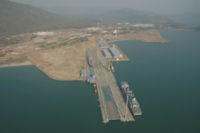
|
||
| Mayurqa | Ground Station | |||
| Salafuabad Space Centre | Ground Station Launching platform |
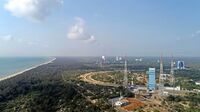
|
Formerly Slavograd Cosmodrome | |
| Suryapur Control Centre | Control Centre Ground Station Launching platform |
|||
| Taka'atui Space Centre | Ground Station Launching platform |

|
Active Programs
| Name | Photo | Type | Start date | End date | Status | Notes |
|---|---|---|---|---|---|---|
| Orbital Command | 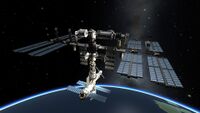
|
manned (space station) |
1675 AN | Active | The first space station launched by 4C. Operated by the Çakar Space Exploration Agency since 1719 AN. | |
| Najma-1 | 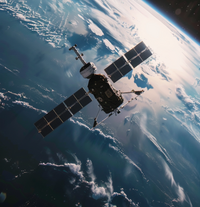
|
unmanned (satellite) |
1723 AN | Active | First satellite launched by the Çakar Space Exploration Agency. | |
| Najma-2 | 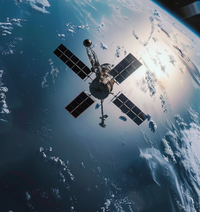
|
unmanned (satellite) |
1725 AN | Active | ||
| Najma-3 | 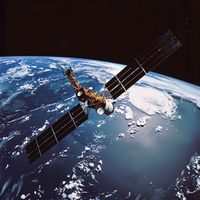
|
unmanned (satellite) |
1727 AN | Active | ||
| Najma-4 | unmanned (satellite) |
1727 AN | Did not achieve orbit | |||
| Najma-4B | 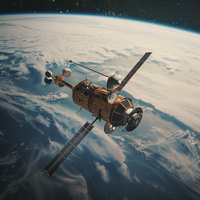
|
unmanned (satellite) |
1729 AN | Active | Replacement of Najma-4 | |
| Najma-5 | 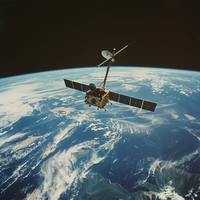
|
unmanned (satellite) |
1728 AN | Active | ||
| Najma-6 | 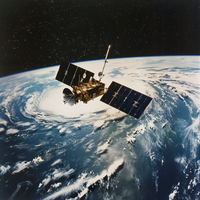
|
unmanned (satellite) |
1731 AN | Active | ||
| Najma-7 | 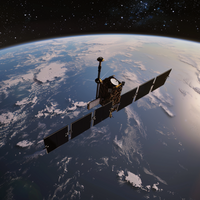
|
unmanned (satellite) |
1732 AN | Active | ||
| Najma-8 | unmanned (satellite) |
1734 AN | Planned |